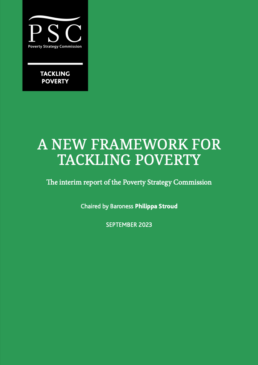The Commission’s Interim Report summarises the findings of the Commission’s work since 2022. It brings together the first steps towards the Commission’s goals of building consensus around the need to tackle poverty in the UK and the tools and approaches that could be successful in doing so.
The starting point is that poverty in the UK is too high and has a range of damaging consequences for individuals in poverty themselves, their families and communities, and the whole of society.
The overall rate of poverty in the UK has remained stubbornly high, a third of children are in poverty and 7% of the population is in deep poverty. While some progress has been made in reducing poverty amongst certain groups, including pensioners and lone parents, these gains have started to be reversed. Deep poverty has become more prevalent and there has been little progress in closing the resilience gaps in outcomes like health, education, family stability and labour market opportunities experienced by people in poverty. The twin challenges of the COVID-19 pandemic and subsequent cost-of-living crisis have only served to deepen these challenges.
Governments of all colours have tried to turn this situation around, but none have brought about the reduction in poverty and improvement in outcomes that we would like. That is why the Commission’s Interim Report outlines a new framework for tackling poverty in the UK. It shows that
- We cannot only focus on incomes; instead we must look to reduce costs (including for housing, childcare and disability) and debt and increase assets and resilience. An effective anti-poverty strategy would cover all of these things.
- The implication is then that actions are required from everyone. Businesses, civic society and individual, families and communities themselves have a role to play alongside direct and supporting action from central, national and local governments.
- To ensure that action is coordinated and effective, the UK needs a new social contract. This should commit to ensuring that no-one has to live in deep poverty in the UK. Beyond this, it must outline the actions and responsibilities of each of those who need to act to tackle poverty.
We hope that this Interim Report marks a turning point in the debate on tackling poverty. We want to prompt action that ensures that, in future, UK poverty is significantly and sustainably lower than it is today, that deep poverty is eradicated and, for those who do experience poverty, outcomes are improved and the chances of people building lives free of poverty is increased.

